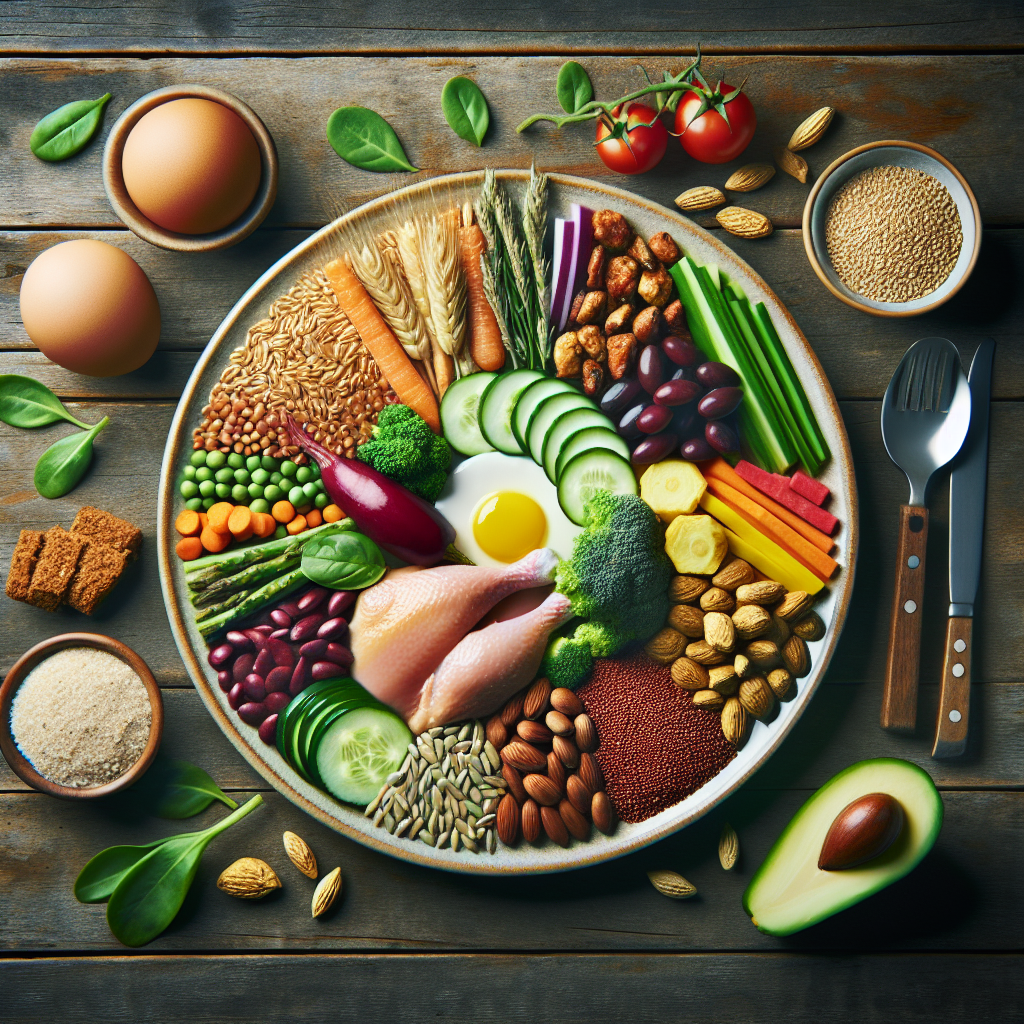If you’re looking to maximize the growth and nutrition of your meat birds, you’ve come to the right place. With a variety of methods and strategies at your disposal, enhancing the nutrition of these birds is both achievable and rewarding. By focusing on key nutrients and providing the right balance of feed, you can ensure that your meat birds not only thrive but also reach their full potential. So, let’s dive into the world of poultry nutrition and uncover the secrets to achieving optimal growth for your feathered friends.
Providing Balanced and Nutrient-Rich Diet
Understanding the Nutritional Needs of Meat Birds
To enhance the nutrition of meat birds and ensure optimal growth, it is crucial to have a good understanding of their nutritional needs. Meat birds, such as chickens raised for meat production, require a balanced diet that provides essential nutrients for their growth and development. These nutrients include proteins, carbohydrates, fats, vitamins, and minerals. By understanding the specific requirements of meat birds, you can tailor their diet to meet their needs and promote healthy growth.
Choosing High-Quality Feed
When it comes to enhancing the nutrition of meat birds, choosing high-quality feed is of utmost importance. High-quality feed ensures that the birds are getting the necessary nutrients in the right proportions. It is essential to purchase feed from reputable suppliers who adhere to strict quality standards. Look for feed that is specifically formulated for meat birds to meet their specific nutritional requirements. Avoid low-quality feeds that may be lacking in essential nutrients or contaminated with harmful substances.
Creating a Balanced Feed Recipe
Creating a balanced feed recipe is an effective way to enhance the nutrition of meat birds. You can formulate your own feed or consult a poultry nutrition specialist to develop a recipe that meets the specific needs of your flock. A balanced feed recipe should include a combination of grains, protein sources (such as soybean meal), fats, vitamins, and minerals. By providing a well-balanced diet, you can ensure that your meat birds receive all the necessary nutrients for optimal growth and development.
Importance of Protein in the Diet
Protein plays a crucial role in the growth and development of meat birds. It is essential for muscle development, feather growth, and overall health. When formulating a feed recipe for meat birds, it is important to ensure an adequate supply of high-quality protein. Good sources of protein for meat birds include soybean meal, fish meal, and poultry by-products. Including protein-rich ingredients in the diet helps in maximizing growth and promoting the development of lean muscle mass.
Incorporating Essential Vitamins and Minerals
In addition to proteins, meat birds also require essential vitamins and minerals for optimal growth and health. These nutrients play a vital role in various physiological functions, including bone development, immune system function, and antioxidant defense. When formulating or selecting feed for meat birds, it is important to choose options that contain a wide range of vitamins and minerals. This can be achieved through the inclusion of vitamin and mineral premixes or the use of high-quality commercial feeds that are fortified with essential nutrients.
Supplementing Feed with Additives
Utilizing Probiotics and Prebiotics
Supplementing feed with probiotics and prebiotics can greatly enhance the nutrition of meat birds. Probiotics are beneficial bacteria that help promote a healthy gut microbiota, improve nutrient digestion and absorption, and enhance the overall immune function of the birds. Prebiotics, on the other hand, are non-digestible fibers that act as food for the beneficial bacteria in the gut, thus promoting their growth and activity. By incorporating probiotics and prebiotics into the feed, you can enhance the gut health of meat birds and improve their overall nutrient utilization.
Adding Enzymes for Enhanced Digestion
Enzymes are another valuable addition to the feed of meat birds. Enzymes help in breaking down complex nutrients, such as carbohydrates and proteins, into simpler forms that can be easily digested and absorbed. By adding enzymes to the feed, you can enhance the digestion and utilization of nutrients, leading to improved growth and performance. Commonly used enzymes in poultry diets include amylase for carbohydrate digestion, protease for protein digestion, and phytase for the breakdown of phytic acid, which enhances phosphorus availability.
Using Amino Acid Supplements
Amino acids are the building blocks of proteins and play a vital role in the growth and development of meat birds. While protein-rich feed ingredients provide a good source of amino acids, supplementing the diet with specific amino acids can optimize growth and performance. Methionine and lysine are two essential amino acids that are commonly supplemented in poultry diets to meet the specific requirements of meat birds. Including amino acid supplements in the feed ensures that the birds have access to the essential building blocks for protein synthesis, resulting in improved growth and muscle development.
Benefiting from Natural Growth Promoters
Natural growth promoters, such as herbs and plant extracts, can be used as additives to enhance the nutrition of meat birds. These natural additives have been shown to have positive effects on growth performance, gut health, and immune function in poultry. Examples of natural growth promoters include garlic, oregano, and turmeric. These additives can be included in the feed or offered separately to the birds. However, it is important to ensure that the chosen natural additives are safe, effective, and do not interfere with the overall balance of the diet.
Ensuring Proper Hydration
Availability of Clean and Fresh Water
Proper hydration is essential for the health and well-being of meat birds. Access to clean and fresh water is crucial to meet their hydration needs. Water should be provided in adequate amounts and should be easily accessible to the birds at all times. Regularly cleaning water containers and providing fresh water helps to prevent the growth of harmful bacteria and ensures that the birds have access to a clean source of hydration.
Using Water Supplements for Electrolyte Balance
In addition to clean and fresh water, water supplements can be used to enhance the hydration and electrolyte balance of meat birds. Electrolytes, such as sodium and potassium, play a crucial role in maintaining the body’s fluid balance. During periods of heat stress or high activity, meat birds may lose electrolytes through sweating, leading to dehydration and imbalance. Water supplements containing electrolytes can be added to the drinking water to replenish these lost electrolytes and maintain proper hydration.
Optimizing Feeding Practices
Adopting Frequent Feedings
To enhance the nutrition and growth of meat birds, adopting frequent feedings can be beneficial. Instead of providing one or two large meals, dividing the daily feed allowance into multiple smaller meals spread throughout the day helps to optimize nutrient intake. Frequent feedings ensure that the birds have a constant supply of nutrients, promoting efficient growth and reducing the likelihood of overfeeding or underfeeding.
Appropriate Feeding Techniques
When feeding meat birds, it is important to use appropriate feeding techniques to encourage optimal nutrient intake. This includes ensuring that feeders are easily accessible to the birds and are placed at an appropriate height. Feeding space should be adequate to prevent overcrowding and competition for feed. Additionally, using feeders that minimize feed wastage, such as those with anti-waste grids or trays, can help reduce feed costs and optimize nutrient utilization.
Avoiding Overfeeding or Underfeeding
Overfeeding or underfeeding can have negative consequences on the growth and development of meat birds. Overfeeding leads to excessive weight gain and can strain the birds’ organs and skeletal structure. On the other hand, underfeeding can result in poor growth and inadequate nutrient intake. To ensure optimal growth, it is crucial to provide the right amount of feed to meat birds based on their age, breed, and growth stage. Monitoring feed consumption and adjusting the feed allowance accordingly helps to optimize nutrient intake and prevent overfeeding or underfeeding.
Managing Outdoor Environments
Promoting Access to Fresh Pasture
If meat birds have access to outdoor environments, it is important to promote their access to fresh pasture. Fresh pasture provides a source of natural vegetation and insects, which can contribute to the nutritional diversity of the birds’ diet. It also allows the birds to engage in natural foraging behaviors, which provides mental stimulation and exercise. Regularly rotating the birds to fresh pasture areas helps to ensure a continuous supply of nutrient-rich forage.
Providing Outdoor Foraging Opportunities
In addition to fresh pasture, providing outdoor foraging opportunities can further enhance the nutrition of meat birds. This can include scattering grains, seeds, or insects in designated outdoor areas for the birds to forage. Outdoor foraging not only supplements their diet but also encourages natural behavior and promotes exercise. It is important to ensure that the foraging areas are safe, free from harmful substances, and protected from predators.
Avoiding Pesticide and Chemical Exposure
When managing outdoor environments for meat birds, it is crucial to avoid pesticide and chemical exposure. Pesticides and chemicals can pose a risk to the health and well-being of the birds. Avoid using pesticides or chemicals in areas where the birds have access. Additionally, be mindful of any potential contamination from neighboring fields or nearby sources of pollution. Minimizing exposure to harmful substances helps to ensure the overall nutritional quality and safety of the birds’ environment.
Minimizing Stress and Disease
Providing a Clean and Well-Ventilated Environment
To enhance the nutrition and growth of meat birds, it is important to provide them with a clean and well-ventilated environment. A clean environment minimizes exposure to harmful bacteria, parasites, and toxins, which can compromise the birds’ health and nutrient utilization. Regularly cleaning and disinfecting the housing area, keeping bedding fresh, and providing proper ventilation helps to maintain a healthy and stress-free environment for the birds.
Implementing Proper Biosecurity Measures
Biosecurity measures are essential for preventing the introduction and spread of diseases in meat bird flocks. Strict biosecurity protocols should be implemented to minimize disease risks. This includes limiting visitors, controlling access to the farm, practicing proper hygiene, and monitoring the health of the birds regularly. By minimizing disease risks, you can ensure that the birds remain healthy, allowing for optimal nutrient utilization and growth.
Monitoring and Treating Common Avian Diseases
Regular monitoring of the birds’ health and implementing appropriate disease prevention and treatment measures is crucial for optimizing their nutrition and growth. Avian diseases, such as respiratory infections, gastrointestinal diseases, and parasitic infestations, can have a detrimental effect on the birds’ overall health and nutrient utilization. Working closely with a veterinarian or avian specialist can help in early detection, diagnosis, and treatment of common avian diseases, ensuring that the birds remain healthy and grow optimally.
Reducing Stress Factors
Stress can negatively impact the growth and health of meat birds. It is important to identify and reduce stress factors in the birds’ environment. This can include minimizing noise, reducing environmental temperature extremes, maintaining a consistent lighting schedule, and avoiding sudden changes in the birds’ surroundings. Minimizing stress helps to maintain the birds’ overall well-being and optimize their nutrient utilization for growth.
Maximizing Growth with Controlled Lighting
Understanding the Impact of Lighting
Lighting plays a significant role in the growth and development of meat birds. Controlling the lighting schedule can influence feed consumption, hormone production, and ultimately, growth rates. Understanding the impact of lighting on meat birds is crucial for maximizing their growth potential. Generally, providing 16 hours of light and 8 hours of darkness per day during the rearing period stimulates feed consumption and faster growth.
Implementing Appropriate Lighting Programs
Implementing appropriate lighting programs is essential for maximizing the growth of meat birds. During the brooding period, providing continuous light for the first 24 to 48 hours helps the birds find feed and water easily. Afterward, transitioning to a regular lighting program of 16 hours of light and 8 hours of darkness promotes optimal growth and development. Additionally, using dimming or gradual lighting adjustments can help to reduce stress during the transition periods.
Monitoring and Adjusting Lighting Duration
Regular monitoring and adjusting of lighting duration is necessary to ensure optimal growth in meat birds. As the birds mature, it may be necessary to adjust the lighting schedule to promote specific growth stages or manage weight gain. Gradually reducing the lighting period to 12 hours per day before processing can help to reduce feed intake and achieve the desired body weight. It is important to carefully monitor the birds’ growth and adjust the lighting duration accordingly to optimize their development.
Supervising Birds’ Weight and Growth
Monitoring Body Weight Regularly
Monitoring the body weight of meat birds regularly is essential to gauge their growth progress and adjust the feed allowance accordingly. Regular weighing helps to identify any deviations from the expected growth rates and allows for timely adjustments in feed quantity or quality. By monitoring body weight, you can ensure that the birds are growing at a healthy pace and make necessary adjustments to optimize their nutrition and growth.
Assessing Growth Rate and Feed Consumption
In addition to body weight, assessing the growth rate and feed consumption of meat birds provides valuable insights into their nutrition and development. By measuring the rate of growth and feed intake, you can evaluate the efficiency of the feed and identify any potential issues early on. Monitoring growth rate and feed consumption allows for adjustments in feed formulations, feeding practices, or environmental conditions to optimize the birds’ nutrition and growth.
Making Necessary Adjustments
Based on the regular monitoring of body weight, growth rates, and feed consumption, it is important to make necessary adjustments to optimize the nutrition and growth of meat birds. Adjustments can include increasing or decreasing the feed allowance, changing the feed formulation, or modifying feeding practices. These adaptations allow for fine-tuning of the birds’ nutrition to ensure optimal growth and performance throughout their development.
Considering Genetic Selection
Choosing Breeds for Optimal Growth
Genetic selection is an important factor to consider when enhancing the nutrition of meat birds. Different breeds have different growth rates and nutrient requirements. When choosing breeds for meat production, selecting those that have been specifically bred for optimal growth and feed conversion efficiency is crucial. Breeds that have higher growth rates and are genetically predisposed to efficient nutrient utilization can help maximize the growth potential of meat birds.
Understanding Genetic Factors
Understanding the genetic factors related to growth and nutrient utilization is essential for optimizing the nutrition of meat birds. Genetic factors influence feed efficiency, muscle development, and growth rates. By working with reputable hatcheries or breeders that prioritize genetic selection for optimal growth, you can ensure that your meat birds have the genetic potential to achieve desired growth rates and efficiently convert feed into muscle mass.
Working with Reliable Hatcheries or Breeders
To ensure the genetic quality and growth potential of your meat birds, it is important to work with reliable hatcheries or breeders. Reputable hatcheries and breeders prioritize genetic selection for optimal growth and have established breeding programs to produce high-quality meat birds. By sourcing your birds from reliable suppliers, you can have confidence in the genetic potential and nutritional requirements of your flock, ultimately enhancing their growth and development.
Consulting Experts and Utilizing Resources
Seeking Advice from Poultry Nutrition Specialists
Consulting poultry nutrition specialists can provide valuable insights and advice on optimizing the nutrition of meat birds. These experts have in-depth knowledge and experience in formulating balanced diets, incorporating additives, and maximizing growth potential. They can help assess the specific needs of your flock, provide guidance on feed formulations, and offer recommendations for optimizing nutrition and growth.
Utilizing University Agricultural Resources
University agricultural resources are valuable sources of information and research on enhancing the nutrition of meat birds. Many universities have agricultural departments or extension services that conduct research and provide resources on poultry nutrition and management. Utilizing these resources can help you access the latest research, best practices, and expert advice specific to meat bird nutrition. University resources can also provide helpful information on feed formulation, health management, and growth optimization.
Staying Informed with Updated Research and Publications
To stay up-to-date on the latest advancements in poultry nutrition and growth optimization, it is important to stay informed with updated research and publications. Scientific journals, industry magazines, and online publications are great sources of information on poultry nutrition. These resources provide insights into new feed additives, feeding strategies, and research findings related to meat bird nutrition. By staying informed, you can continue to enhance the nutrition of your meat birds and implement the latest best practices for optimal growth.
In conclusion, enhancing the nutrition of meat birds to ensure optimal growth requires a comprehensive approach that considers their specific needs and utilizes various strategies. Understanding their nutritional requirements, choosing high-quality feed, supplementing with additives, ensuring proper hydration, optimizing feeding practices, managing outdoor environments, minimizing stress and disease, maximizing growth with controlled lighting, supervising weight and growth, considering genetic selection, and consulting experts and utilizing resources are essential factors to consider. By implementing these strategies, you can enhance the nutrition of your meat birds and promote their optimal growth and development.




